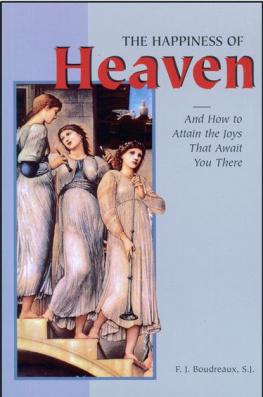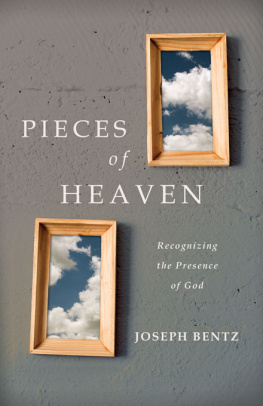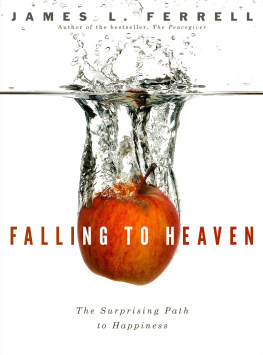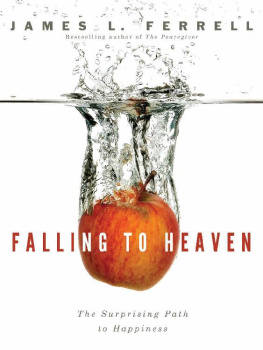The Happiness of Heaven: And How to Attain the Joys That Await You There was originally published without a subtitle in 1871 by John Murphy and Company, Baltimore, Maryland. This 1999 edition by Sophia Institute Press contains minor revisions to the original text.
Burne-Jones, in the Tate Gallery, London, England (photo courtesy of the Tate Gallery, London/Art Resource, New York).
No part of this book may be reproduced, stored in a retrieval system, or transmitted in any form, or by any means, electronic, mechanical, photocopying, or otherwise, without the prior written permission of the publisher, except by a reviewer, who may quote brief passages in a review.
Boudreaux, F. J.
The happiness of heaven : and how to attain the joys that await you there / F.J. Boudreaux.
p. cm.
Originally published: Baltimore, Md. : J. Murphy and Co., 1871.
Includes bibliographical references.
ISBN 0-918477-95-6 (pbk. : alk. paper)
1. Heaven Christianity. 2. Catholic Church Doctrines.
Editors Note: Unless otherwise noted, the biblical references in the following pages are based on the Douay-Rheims edition of the Old and New Testaments. Where applicable, quotations from the Douay-Rheims edition have been cross-referenced with the differing names and numeration in the Revised Standard Version, using the following symbol: (RSV =).

The Happiness
of Heaven

Reason, Revelation, and the experience of six thousand years unite their voices in proclaiming that perfect happiness cannot be found in this world. It certainly cannot be found in creatures, for they were not clothed with the power to give it. It cannot be found even in the practice of virtue, for God has, in His wisdom, decreed that virtue should merit, but never enjoy, perfect happiness in this world. He has solemnly pledged Himself to give eternal life
This happiness which is now so incomprehensible to us is none other than the possession and enjoyment of God Himself in the Beatific Vision, as well as the perfect satisfaction of every rational craving of our nature in the glorious resurrection of the body. It is on this glorious happiness that we are going to meditate. First, we shall endeavor to obtain a definite idea of the Beatific Vision, which is the essential constituent of heavenly bliss.

We envision Heaven in different ways
In meditating upon the happiness in store for the children of God, we are very apt to build up a heaven of our own, which naturally takes the shape and color which our sorrows, needs, and sufferings lend to it. The poor man, for instance, who has suffered much from toil and want, looks upon Heaven as a place of rest, abounding with all that can satisfy the cravings of nature. Another, who has often endured the pangs of disease, looks upon it as a place where he shall enjoy perpetual health of body and mind. Another again, who, in the practice of virtue, has had all manner of temptations from the Devil, the world, and his own flesh, delights in viewing Heaven as a place totally free from temptation, where the danger, or even the possibility, of sin shall be no more.
All these, and other similar views of Heaven, are true inasmuch as they represent it as a place entirely free from evil and suffering, and, at the same time, as an abode of positive happiness. Nevertheless, they are all imperfect views, because not one of them takes in the whole of heavenly bliss, such as God has revealed it to us. They all ignore the Beatific Vision, which is the essential happiness of Heaven.
But even among those who look upon Heaven as a place where we still see God, very few indeed understand what is implied in the vision of God. Many imagine that we shall simply gaze upon an object whose surpassing perfection will make us happy in a way that we do not understand. These do not fully comprehend what is meant by the Beatific Vision, although they view Heaven as a place where we shall see God.
Let us, therefore, endeavor to understand what Faith and theology teach us concerning the Beatific Vision. We shall see that it is the essential happiness of the blessed, which fills them with the purest and most complete satisfaction, and, moreover, that it is in virtue of this Beatific Vision that the blessed are enabled to enjoy the additional or secondary pleasures which cluster around the throne of God.

The two types of happiness in Heaven
Theologians divide the happiness of Heaven into essential and accidental . By essential is meant the happiness which the soul receives immediately from God in the Beatific Vision. By accidental is meant the additional pleasures or joys which come to the blessed from creatures.
Therefore, when our blessed Lord says, There shall be joy in Heaven upon one sinner doing penance, He evidently means a new joy, which the blessed did not possess until sorrow for sin entered that sinners heart. They were already happy in the Beatific Vision and would not have lost the slightest degree of their blessedness, even if that sinner had never repented of his sins. Still, they experience a new joy in his conversion, because in it they see God glorified; moreover, they have reason to look for an additional brother or sister to share their bliss.
Yet, although the blessed do rejoice in the conversion of the sinner, they do so in virtue of the Beatific Vision without which they could receive no additional pleasure from creatures. Therefore, the Beatific Vision is not only the essential happiness of Heaven, but it is also that which imparts to the saints the power of appropriating all the other inferior joys with which God completes the blessedness of His children. As this is a point of importance, we shall endeavor to understand it more clearly by an illustration.
A man who is gifted with perfect health of body and mind not only enjoys life itself, but he likewise receives pleasure from the beauties of nature from literature, amusements, and society. Now, suppose he loses his health and is thrown on a bed of sickness. He is no longer able to enjoy either life itself or its pleasures. What is all the beauty of earthly or heavenly objects to him now? What are amusements, and all the joys of sense, which formerly delighted him so much? All these things are now unable to give him any pleasure, because he has lost his health, which afforded him the power of appropriating the pleasures of life. Therefore, we say that health is essentially necessary, not only to enjoy life itself, but also to relish its pleasures.












